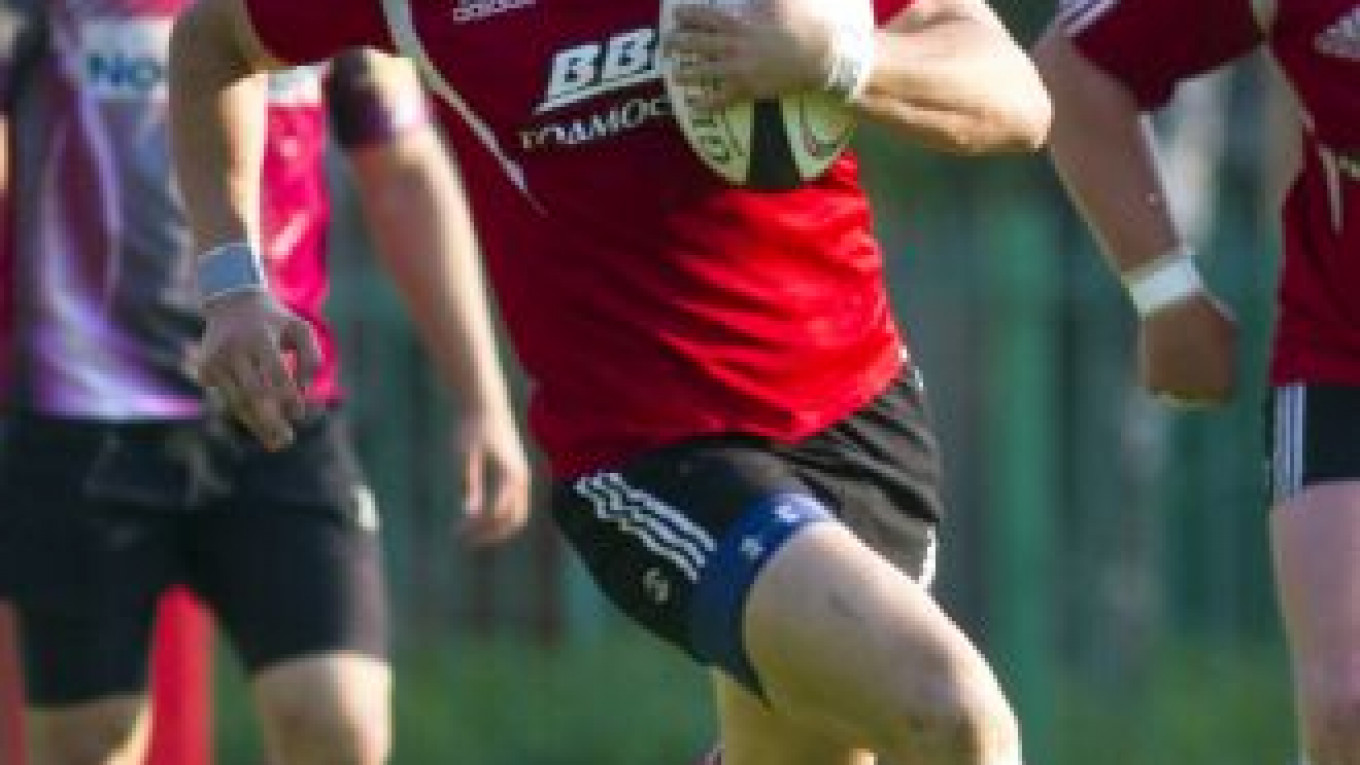Vasily Artemyev is not like the average Russian sportsman; he speaks with a soft Dublin accent, has a law degree and plays rugby for one of the best clubs in Europe — Northampton Saints.
A few Russian players have been picked up by European sides in the last few years but, much like their higher-profile footballing compatriots, had struggled to make a significant mark. Artemyev, however, impressed instantly when he joined at the end of 2011, scoring six tries in his first three games and for a time keeping England regular Chris Ashton out of the team.
Artemyev, who plays as a winger, is modest about his season so far, though.
"There's been ups and downs, but it's been good I think. It's been hard at times to keep up with the pace with games every week at this intensity," he said. "I think I've coped quite well."
He started playing rugby as a 10-year-old in Zelenograd but furthered his career when he moved to Ireland, aged 15, for what was supposed to be a year to improve his English. By chance, he ended up at Ireland's most prestigious rugby school, Blackrock College.
"It's a big alma mater of lots of rugby stars in Ireland. Rugby is like a religion there, everybody plays it; out of 900 students, I'd say 800 play rugby," he said.
As it turned out, Artemyev, now 24, stayed there for six years, completing a degree at University College Dublin and playing for Ireland under-19s along the way, but he has no regrets about not trying to play for the Ireland senior side.
"I'm not particularly frustrated about not staying in Ireland, I was really happy to get involved in the Russian team," he said. "All my family is from here and lives in Russia, so it felt kind of right to play for Russia."
Playing for Russia led Artemyev to the Rugby World Cup in September, where the Bears lost all their games but gave a good account of themselves against experienced opposition.
"It was massive, a massive experience. The exposure we got. We weren't used to it. Some of the warm-up games were massive as well," he said. "It was a massive training curve and practice for a lot of players to see what the intensity is like at that level. Hopefully next time we'll be able to cope."
The World Cup appearance, Russia's first, is another point in the sport's revival. Artemyev believes that the inclusion of rugby sevens, the shorter form of the game, in the 2016 Olympics has been important in this regeneration.
"I've been involved with the sevens team for the last couple of years as well, and I think they put more emphasis on the sevens now, as it is in the Olympics. Obviously from the point of view of the government, their priority is the Olympic sports," he said.
This increase in funding has meant a surge in popularity on a grassroots level.
"There's a lot more opportunities for kids to play rugby now than when I was playing. In the All-Russia Championships I played in, there were about five or six teams, whereas now there are more than 20," he said. "There are regional championships, there's the Russian championship, which has more than 15 teams, I don't think they can even accommodate all the teams, they have to pick one or two from each region. It's a big change."
In the short term, Artemyev believes that it is important that more players follow him to Europe. Russia captain Vladislav Korshunov and fellow international Viktor Gresev recently signed for London Wasps until the end of the season.
"I hope they stay in England, whether it be at Wasps or other clubs. Hopefully it will raise the level of the national team, having players playing abroad," he said. "There's a lot of good guys going through the national team at the moment and hopefully they will get good exposure."
He thinks that rugby has the potential to expand and that it suits the Russian temperament.
"I think it is quite appealing to Russian people; it's physical in nature, it's fast and it's a team sport and character building," he said. "Having it on the telly during the World Cup was a really good thing. A lot of my friends, who had only heard about it before, watched it and have fallen in love with it."
A Message from The Moscow Times:
Dear readers,
We are facing unprecedented challenges. Russia's Prosecutor General's Office has designated The Moscow Times as an "undesirable" organization, criminalizing our work and putting our staff at risk of prosecution. This follows our earlier unjust labeling as a "foreign agent."
These actions are direct attempts to silence independent journalism in Russia. The authorities claim our work "discredits the decisions of the Russian leadership." We see things differently: we strive to provide accurate, unbiased reporting on Russia.
We, the journalists of The Moscow Times, refuse to be silenced. But to continue our work, we need your help.
Your support, no matter how small, makes a world of difference. If you can, please support us monthly starting from just $2. It's quick to set up, and every contribution makes a significant impact.
By supporting The Moscow Times, you're defending open, independent journalism in the face of repression. Thank you for standing with us.
Remind me later.






